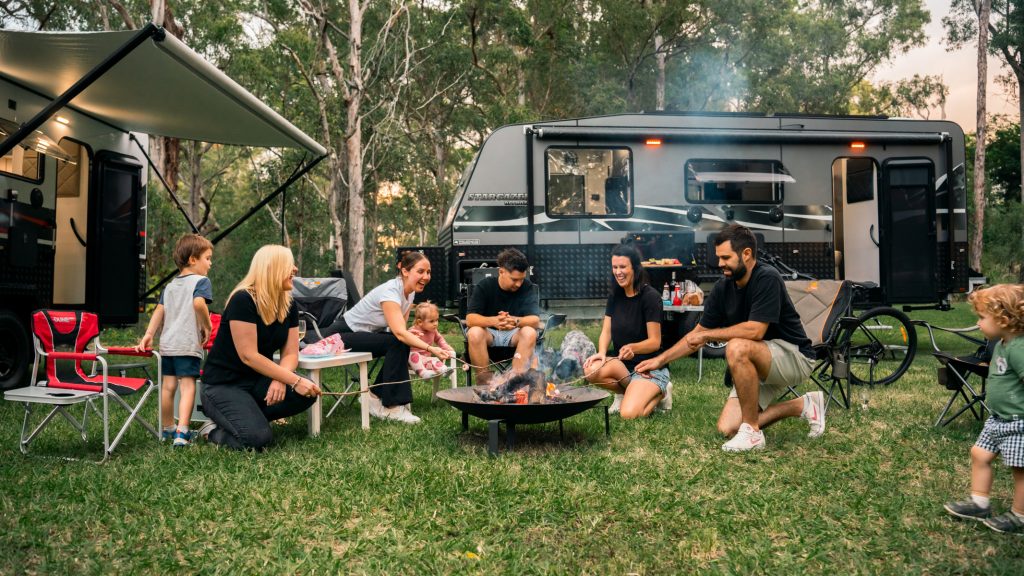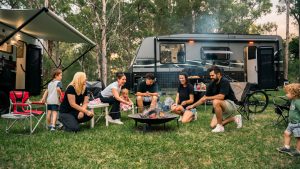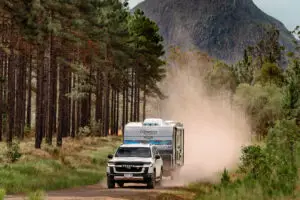Retirement in Australia isn’t about slowing down – for many, it’s about gearing up for the next big adventure. Meet the grey nomads: an ever-growing community of over-50s hitting the road with caravans, seeking freedom, fun and a taste of the open road. If you’re an experienced caravan owner looking to upgrade to a tougher off-road van, or simply a retiree craving more adventure, this guide is for you. Off-road caravanning in your golden years is absolutely doable – and incredibly rewarding – with a bit of preparation and the right mindset. Let’s explore how you can embrace the ultimate retirement caravan lifestyle, enjoying outback adventures without sacrificing comfort.
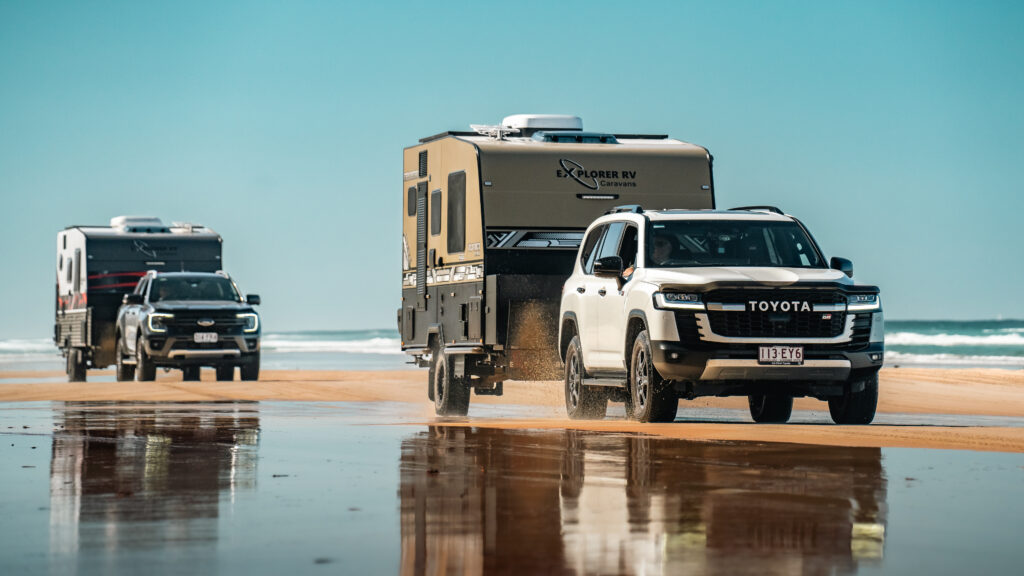
Embrace the Freedom of Off-Grid Living
One of the biggest appeals of off-road caravanning in retirement is the freedom to leave crowded caravan parks behind and camp in more secluded, natural spots. After years of schedules and responsibilities, how good is it to have no fixed address and chase perfect weather around the country? Embrace that freedom! With an off-road setup, you can venture down dirt tracks to find quiet riverbank camps, bush camps under the gum trees, or beachfront hideaways where the only sound is the ocean. Off-grid camping (free camping) also saves you money – a big plus for retirees on a fixed income. Modern off-road vans come equipped with large water tanks, solar panels, generators, and ample battery storage, making off-grid living easier than ever. For example, the Explorer RV Stargazer caravan features a robust solar power system and generous water capacity, meaning you can camp comfortably for days (or weeks) without needing to plug in. Many grey nomads find that balancing a mix of caravan park stays and free camps is ideal. Parks are great for laundry, long hot showers, and socializing with fellow travelers, while free camps offer solitude and that unbeatable feeling of waking up in pure nature. As a retiree, you have the time to spend a week by that stunning billabong or atop a remote hill with a view – savor those moments. This freedom is what the off-road life is all about.
Stay Comfortable: Your Home-on-Wheels Amenities
Just because you’re camping off the beaten path doesn’t mean you have to rough it. In fact, one could argue grey nomads have perfected glamping in the outback. Today’s off-road caravans are designed with comfort in mind – from full queen-size beds and en-suite bathrooms to reverse-cycle air conditioners and diesel heaters for climate control. As you upgrade or outfit your off-road van, prioritize the features that matter for your comfort and health. Love your morning cuppa? Ensure you have a reliable gas stove or even a coffee machine (with adequate inverter power). Need to mind your back? Consider an ergonomic mattress and perhaps an outdoor annex mat to create a flat, trip-free zone around your van. If you’re eyeing lots of bush camping, think about installing extra shade awnings or privacy screens – they’ll keep you cool and give a sense of “patio space” wherever you park. Many retirees travel with pets for companionship, so setting up your caravan to be pet-friendly (think portable pet enclosures or a ramp for older dogs to get into the van) can be a game-changer. Little upgrades like these make daily life on the road more comfortable. And don’t forget entertainment: a good bookshelf or e-reader, maybe a satellite TV setup for those quiet nights, or a hobby kit (painting, photography, fishing gear – whatever tickles your fancy). The beauty of caravanning is you can bring your hobbies with you. Comfort is not a luxury on the road; it’s a necessity to keep you enjoying the lifestyle long-term. So kit out that van with your creature comforts – you’ve earned it!
Health & Wellbeing on the Road
Staying healthy and safe is paramount, especially as we age (like fine wine, of course!). Caravanning itself can keep you active – setting up camp, exploring walking trails, casting a fishing line, even just stepping in and out of the van gives you more movement than sitting on the couch at home. To maintain wellbeing on your off-road travels, keep a routine that works for you. Many grey nomads swear by a morning stretch or short walk around the campsite to limber up. Take advantage of nature’s playground: swim in those outback hot springs or beach shallows when you can, and do a bit of sightseeing on foot. It’s exercise that doesn’t feel like exercise. Another tip is to mind your diet and hydration, especially in Australia’s warmer climates – always have plenty of drinking water on board and refill your stocks at every safe opportunity. Carry an appropriate first aid kit and any prescription medications in ample supply (since the nearest pharmacy could be hundreds of kilometers away in the bush). For peace of mind, consider investing in a personal EPIRB (distress beacon) or satellite phone if you’re doing very remote travel – it’s like insurance; you hope not to use it but it’s reassuring to have. Mental health is just as important: the nomadic life can occasionally get lonely or stressful (like when weather forces a change in plans). Stay connected with loved ones back home via phone or video calls when you get signal. Better yet, connect with the on-road community – grey nomads are a friendly bunch! Stop in at happy hour in campgrounds, chat with fellow travelers at the dump point or water fill station, share stories and tips. Many lifelong friendships have been formed around a campfire on the Big Lap. And if you’re traveling as a couple, make sure to give each other space and grace – everyone needs a bit of “me time,” even in a cozy caravan. Bring along hobbies that relax you, whether it’s a good book, a sketchpad, or that ukulele you’ve been meaning to learn. A healthy nomad is a happy nomad.
Budgeting & Saving on the Go
Life on the road can be as cheap or as expensive as you make it, but retirees often keep a close eye on the budget to stretch out their travels. Off-road caravanning offers some great money-saving opportunities if you plan wisely. For starters, free camping (as mentioned earlier) can drastically cut accommodation costs – and in Australia there are thousands of free or low-cost campsites, especially once you venture inland. Utilize resources like the WikiCamps app or Camps Australia Wide guide to find these spots. Many grey nomads also take advantage of senior discounts: national park camping fees, ferry crossings, and even some caravan park rates have discounted prices for seniors – always ask! Fuel will likely be one of your biggest expenses, so anything you can do to improve fuel efficiency helps. Keep your vehicle well-tuned, drive at a sensible speed (pushing that diesel 4WD too hard not only risks damage but also guzzles fuel), and lighten your load if possible (do you really need that 5th camp chair or the entire shed worth of tools?). When you do need caravan park comforts, consider off-peak stays – many parks offer cheaper weekly rates or special deals outside of school holidays. Shopping savvy is another aspect: stock up on pantry staples in bigger towns where prices are lower, and support local farmers markets for fresh produce when you can (you’ll get better quality and often better prices). An increasing number of grey nomads also find small ways to earn on the road – from seasonal work like fruit picking or campground hosting, to selling crafts or photography online. This isn’t necessary for everyone, but if you enjoy a little side project, it can subsidize the trip fund. Overall, living on the road tends to simplify expenses – you realize you don’t need a lot of stuff to be happy. The “wealth” you gain is in experiences: watching the sun set over a desert, or sharing billy tea with a fellow traveler. And those are priceless.
Adapting and Thriving in the Off-Road Lifestyle
The grey nomad lifestyle is a dynamic one – plans can change with the weather, or on a whim when a fellow traveler says “you absolutely must see this place…”. Being adaptable is part of the fun. Maybe you intended to spend a week in the Red Centre and end up volunteering at a bush charity event for a month, or you detour to join friends on an impromptu fishing trip in the Gulf. Go with the flow! Without work commitments tying you down, you can take opportunities as they come. That said, it helps to travel smart. Keep an eye on seasons and climates: chase the cooler weather in summer (many head north or to the coast in winter, then south or inland in the cooler months – the classic “lap” strategy). If you’re new to off-roading, you don’t have to tackle the hardest track on day one. Maybe start with easier adventures: for example, try a 1-2 week round trip from Brisbane with some dirt roads and national park camps to test out your off-grid setup and build confidence (We’ve got a blog post on some great 1-2 week Queensland routes to get you started.) Each trip, you’ll learn more about what you truly need and how far you’re comfortable pushing your rig.
Also, don’t underestimate the value of community and knowledge sharing. Join grey nomad groups (both online forums and real-life meet-ups). Australia’s caravan community is incredibly welcoming – there’s always a happy hour circle or a camp oven roast to join if you want company. Seasoned nomads love sharing tips on everything from the best free camps to the best caravan insurance. Speaking of which – ensure your insurance covers off-road use and the full value of your upgrades (things like solar setups or generators often need to be specified).
Lastly, remember that retirement caravanning is not a race. Take rest days when you need. Treat yourself to a caravan park cabin or motel night occasionally if you crave four solid walls or a long bathroom break. Fly home for a grandkid’s birthday if you miss them – the road will always be here when you return. The joy of this lifestyle is you’re the boss of your time. Some days you’ll cover 300 km; other days you might stay put and watch birds flit around the campsite all afternoon. And both are perfectly wonderful ways to spend your day.
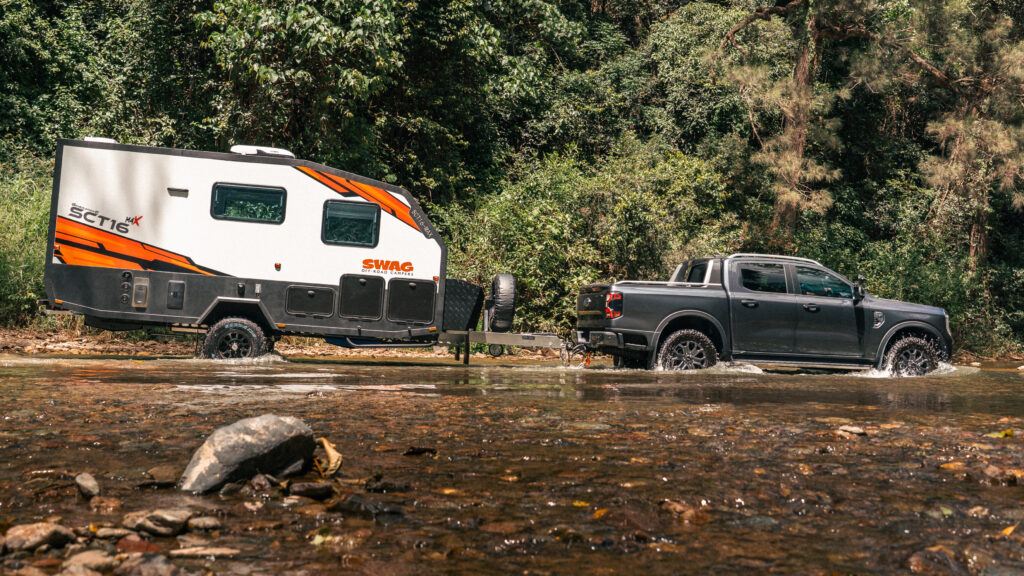
In Summary: Off-road caravanning offers retirees an unmatched blend of adventure, freedom, and comfort. With the right preparation – from kitting out a comfy, capable caravan to staying mindful of health and budget – your retirement can turn into one grand Aussie road trip, or a series of beautiful wandering seasons. You’ve worked hard to get to this stage of life; now it’s time to explore our amazing backyard at your own pace. Whether you’re camped by a remote billabong listening to kookaburras, or gathered with new friends around a fire swapping yarns under the Milky Way, you’ll likely find yourself saying, “Why didn’t we do this sooner?” So here’s to the grey nomads living the dream – may the road be kind, the coffee strong, and the adventures plentiful. Safe travels and happy off-roading!

